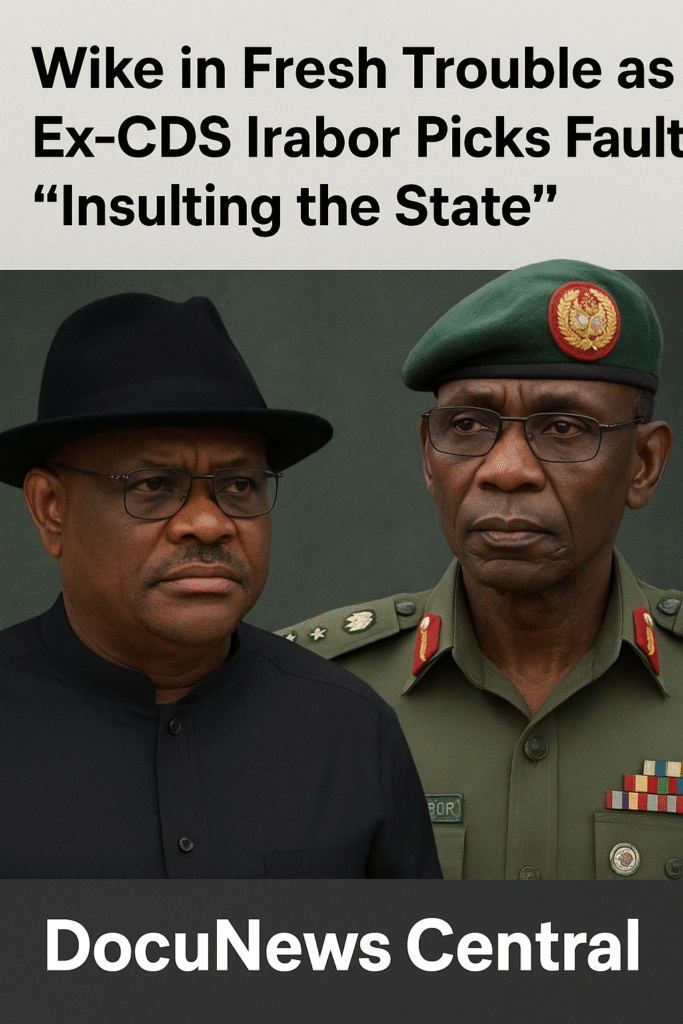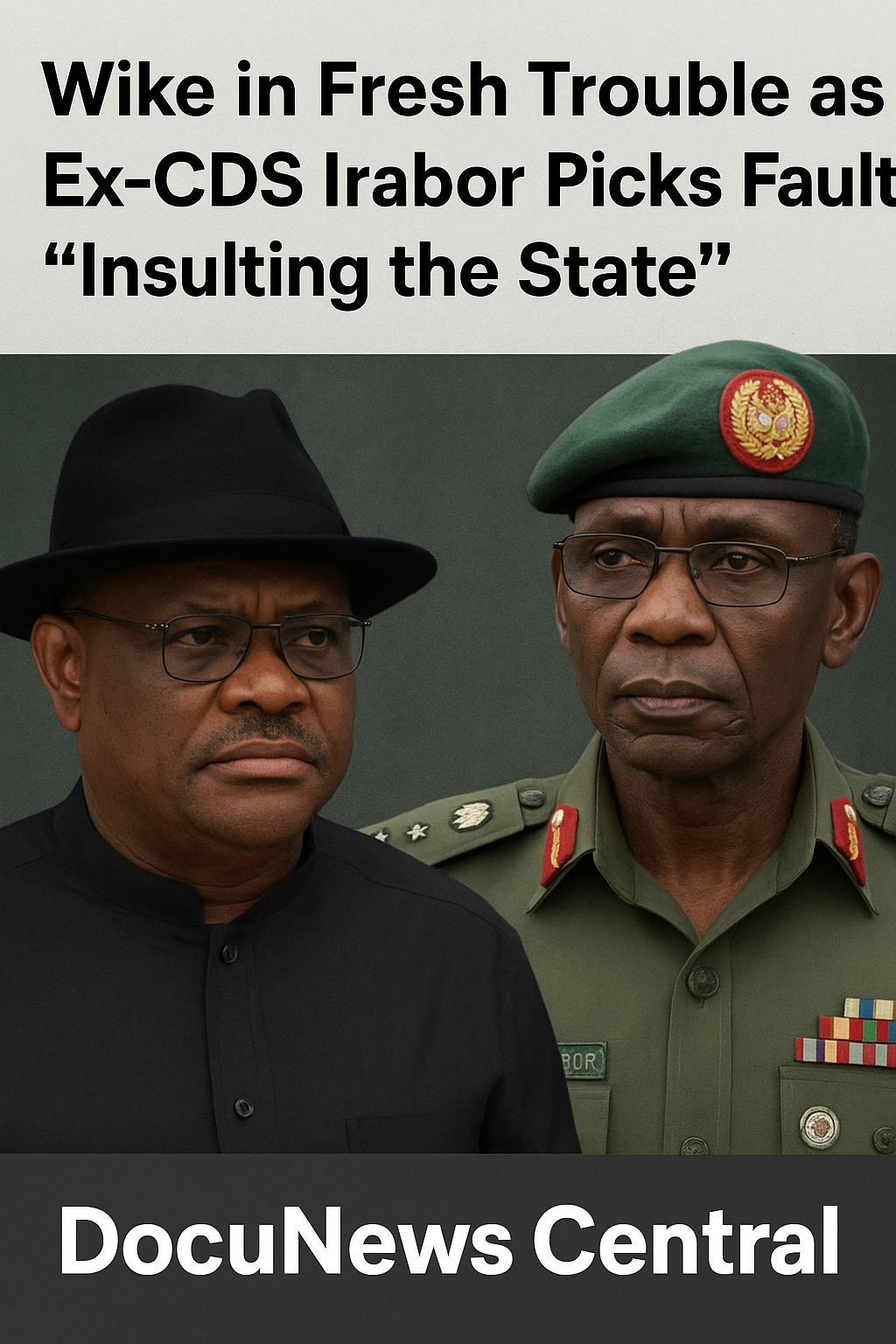
Fresh controversy is unfolding in Nigeria’s political circle as former Chief of Defence Staff, General Lucky Irabor (Rtd), has openly criticized the Minister of the Federal Capital Territory, Nyesom Wike. According to Irabor, some of Wike’s recent comments and actions amount to “insulting the Nigerian State.” Because of this sharp criticism, the political temperature in Abuja has risen once again. The clash between these two powerful figures is already generating intense public debate.
This is not the first time Wike’s conduct has raised questions. In fact, he has been in the spotlight for several months over political disputes and leadership controversies. Earlier reports of his confrontation with former Chief of Army Staff, Lt. Gen. Buratai, had already caused public concern. Now, Irabor’s remarks add a new layer of tension to an already heated situation. Many Nigerians are asking: What exactly sparked this criticism, and what does it mean for the country?
The Trigger: Irabor’s Strong Rebuke
General Irabor, respected nationwide for his calm leadership style, rarely comments publicly on political issues. Therefore, his recent remarks carried weight. He stated that public office holders must choose their words carefully, especially when discussing national security institutions. Moreover, he emphasized that reckless comments can harm national unity and weaken institutional authority.
Irabor insisted that no leader should destabilize the country through careless statements. According to him, “public officials must understand the weight of their words because careless remarks can insult the nation they swore to serve.” His choice of words immediately ignited conversations online. Many interpreted his comment as a direct response to Wike’s recent verbal exchanges with political opponents and traditional institutions.
This rebuke came at a time when the nation is already dealing with rising insecurity. Nigerians have not forgotten the kidnapping of six Defence Ministry directors, which exposed major lapses in national security systems. Because of these challenges, Irabor believes political leaders must stop making inflammatory comments that may add pressure to an already fragile system.
Wike’s Increasing Trouble
Wike is no stranger to controversy. Even before he was appointed FCT Minister, he consistently made bold, confrontational statements that often resulted in political quarrels. His critics argue that he employs a “bulldozer style” of leadership that does not align with the diplomacy expected from top government officials. Supporters, however, describe him as fearless and direct.
Regardless, these controversies are adding up. His recent statements about land disputes generated nationwide arguments. He also found himself in heated exchanges with state governors and political associates. Because of these conflicts, Irabor’s latest criticism has only intensified public scrutiny. Some analysts now believe that Wike may be losing institutional support, especially from military circles that value discipline and order.
The former CDS did not mention specific incidents. Yet, many Nigerians believe he was referring to the same pattern of outbursts that have dominated headlines. For example, Wike’s confrontation with former military leaders continues to create tension. His growing political influence in Abuja also puts him under deep examination from those who believe he needs to exercise more caution.
The Broader Implications for National Politics
Irabor’s criticism is not merely a personal attack. It touches the heart of Nigeria’s political stability. Today, the country faces multiple challenges—including economic struggles, insecurity, political mistrust, and public frustration. Because of this, many citizens expect leaders to demonstrate emotional intelligence when speaking in public.
Whenever top officials clash publicly, it sends the wrong signal. It creates unnecessary distrust, especially among citizens who already feel neglected or unsafe. Nigeria is currently navigating a delicate period, and any comment interpreted as “insulting the state” can trigger broader concerns.
Political analysts warn that this rift could fuel divisions within the ruling political structure in Abuja. Some even argue that the clash may influence alliances ahead of the 2026 elections. As a result, every remark coming from influential individuals like Irabor and Wike must be carefully examined. Their words can shift the political climate significantly.
Reactions from Nigerians and Security Experts
As expected, reactions have poured in from different stakeholders. Many Nigerians commended Irabor for speaking up. They believe leaders should not act like they are above the nation. In their view, Wike’s aggressive style needs moderation. Some went as far as saying they felt relieved that someone with Irabor’s reputation finally addressed the issue.
On the other hand, a different group believes Irabor should have been more diplomatic. They argue that speaking publicly could worsen tensions rather than resolve them. However, security experts have largely supported Irabor’s remarks. They insist that disrespect toward national institutions—whether intentional or not—must be addressed quickly.
These security professionals argue that the Nigerian state should never appear weak. They believe that for the nation to maintain stability, political leaders must cooperate with security institutions rather than create unnecessary conflict. Because of this, some experts worry that Wike’s frequent confrontations may affect inter-governmental harmony.
A Pattern of Rising National Tension
This issue does not exist in isolation. It follows a troubling pattern of national controversies that have emerged in recent months. Nigeria has been grappling with tensions, protests, political clashes, and disturbing incidents. For instance, Samuel Ortom’s statement about government backing terrorists created significant public outrage. Also, the recent Shi’ite protest in Kano added more pressure on security agencies already stretched thin.
Additionally, Nigeria’s political climate has remained unstable. Claims of internal political sabotage, corruption allegations, and increasing distrust among political actors continue to dominate discussion spaces. Because of these underlying issues, Irabor’s remarks seem like an attempt to remind public officials that their words have consequences.
Experts argue that Nigeria cannot afford another political crisis. The nation is already experiencing economic hardship. The cost of living continues to rise, and unemployment remains a serious concern. Citizens are becoming more sensitive to issues that relate to governance and national integrity. Therefore, many believe Wike and other public figures must exercise caution and responsibility.
Inside Abuja: Tension in the Power Circle
Within Abuja’s political circle, the relationship between politicians and the military remains delicate. While the constitution guarantees civilian leadership, the military still plays a critical role in maintaining national stability. Because of this, any direct criticism from a former CDS carries deep significance.
Insiders claim that many top officials in Abuja are watching the situation closely. Some believe Wike may respond soon. Others think he will remain silent to avoid escalating the matter. Regardless of his decision, the issue will continue to raise questions about discipline, respect, and responsible communication within government ranks.
Political observers also point out that Wike’s rising influence in Abuja could threaten established power balances. His popularity within the ruling government, strong administrative approach, and bold statements have earned him both supporters and enemies. Therefore, Irabor’s warning may represent more than just a personal disagreement. It may reflect deeper concerns within Nigeria’s power structure.
Public Expectations Moving Forward
At this stage, Nigerians are demanding maturity from their leaders. Citizens want development, stability, and good governance—not public quarrels. Because of this, many Nigerians believe Wike should focus on delivering value in the FCT. Irabor, on his part, has already made his point. As a respected former military leader, many believe his words should be taken seriously.
If Wike responds aggressively, the situation might escalate. Conversely, a more diplomatic response could calm tensions. For now, observers expect both men to adopt a more cautious tone. After all, Nigeria needs unity more than anything else at this moment.
Conclusion
In conclusion, the confrontation between Wike and Gen. Irabor signals a major moment in Nigeria’s political trajectory. It raises important questions about leadership, communication, national respect, and political responsibility. Nigeria is entering a period where every statement matters. Therefore, leaders must act with restraint and wisdom.
As Nigerians continue watching the developments, one thing is clear: public officials hold a duty to uphold national dignity. Their comments must strengthen—not weaken—the stability of the state. Because of this, Irabor’s warning remains a significant reminder for all leaders seeking public trust.
For deeper insights into ongoing national issues, you can explore our related reports, including El-Rufai allegedly fleeing to Qatar, the NYSC registration crisis, and Wike’s previous clash with Buratai. These stories help reveal the rising tensions shaping Nigeria’s evolving political landscape.












Thank you for your sharing. I am worried that I lack creative ideas. It is your article that makes me full of hope. Thank you. But, I have a question, can you help me?